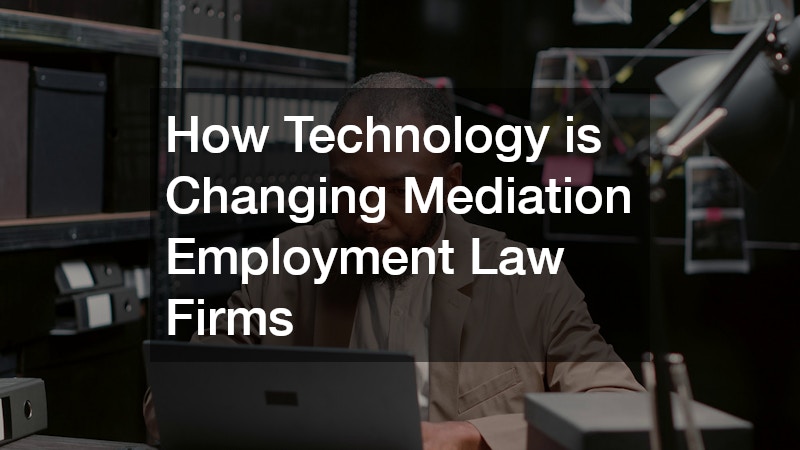The impact of technology on mediation within employment law firms is profound and multifaceted. This article explores how technological advancements are streamlining processes of mediation employment law, enhancing client satisfaction, addressing security challenges, transforming legal research, and paving the way for future innovations in mediation.
What Role Does Technology Play in Streamlining Mediation Processes?
Automation of Administrative Tasks
Automation is revolutionizing administrative tasks like scheduling and documentation within mediation processes. The use of specialized software enables law firms to handle these processes with improved efficiency and reduced chances of error.
These systems allow mediators to focus more on resolving conflicts rather than managing paperwork. Firms adopting these technologies have reported a significant decrease in administrative workload.
The integration of automation tools ensures that all parties involved are informed and updated in real time. It enhances coordination and synchronization among mediators and clients, streamlining the pathways toward resolution.
Digital Communication Platforms
Digital platforms, such as video conferencing and instant messaging, are redefining communication efficiency during mediation processes. These tools provide a flexible and convenient medium for mediators and clients to interact seamlessly across geographic barriers.
The enhanced communication capabilities through digital means lead to quicker resolutions and more effective negotiations. It facilitates a more collaborative environment, essential for mediation proceedings.
Moreover, the adoption of integrated communication solutions increases the accessibility of mediation services to a wider audience. It allows firms to cater to diverse client needs effectively, growing their practice exponentially.
How Has Technology Enhanced Client Engagement and Satisfaction?
Online Client Portals
Online client portals offer 24/7 access to case information, boosting transparency and client satisfaction. These portals serve as a central repository for documents, case updates, and communication history.
Clients appreciate real-time updates and the ability to self-service their inquiries, leading to heightened engagement. This transparency fosters trust and strengthens client-law firm relationships significantly.
By empowering clients with all relevant information at their fingertips, these portals reduce the need for repetitive inquiries. It efficiently balances workload distribution between mediators and their assistants.
Improved Feedback Mechanisms
Technology enables law firms to collect and analyze client feedback effectively. Online surveys and rating systems allow immediate response collection, helping firms quickly gauge client satisfaction levels.
Analyzing feedback helps law firms tailor their services to better meet client expectations and preferences. Continuous improvement in service delivery is driven by insights drawn from detailed feedback analytics.
This proactive approach not only enhances client satisfaction but also strengthens the competitive advantage of a firm. Regular assessments of client interactions ensure that mediation services remain client-centric and dynamic.
What Security Challenges Are Associated With Technology in Mediation?
Data Privacy Concerns
Data privacy is a major concern for technology-driven mediation, necessitating stringent protective measures. Law firms must ensure that sensitive client data remains confidential and secure from unauthorized access.
Implementing robust data protection protocols is essential to maintaining client trust. Firms should constantly update their privacy policies to align with evolving regulatory standards.
Moreover, firms need to educate employees regarding the importance of data privacy and potential risks. A well-informed workforce is critical in safeguarding against inadvertent data breaches.
Cybersecurity Measures
As technology becomes integral to mediation employment law, strong cybersecurity measures are imperative to prevent potential breaches. Firms should adopt comprehensive security frameworks to protect data integrity and confidentiality.
Regular cybersecurity audits help identify vulnerabilities and remedy them promptly. Firms must stay vigilant against evolving threats in the digital landscape.
Investing in robust cybersecurity infrastructure reassures clients about the security of their comprehensive data. Effective cybersecurity strategies safeguard not only client information but also the firm’s reputation.
In What Ways Is AI Transforming Legal Research for Mediation?
AI-Powered Research Tools
AI-powered research tools are enhancing the speed and accuracy of legal research in mediation employment law cases. These tools efficiently sift through vast amounts of data to provide precise legal insights.
The application of AI in legal research reduces time spent on case preparation, allowing for a more focused approach to mediation. It empowers mediators with data-driven strategies to resolve conflicts effectively.
By facilitating access to current and relevant legal information, AI tools contribute to more informed decision-making in mediation processes. They are instrumental in generating tailored solutions that address specific client disputes.
Predictive Analytics in Conflict Resolution
Predictive analytics in mediation assists in forecasting outcomes, enabling informed strategy formulation. By assessing past case data, these analytics anticipate potential trajectories and resolutions.
They provide mediators with insights that enhance strategic planning and negotiation efficiency. This data-centric approach significantly improves the likelihood of successful mediation outcomes.
Integration of predictive models helps firms allocate resources effectively and optimize resolution timelines. The increasing reliance on analytics reflects a shift towards evidence-based mediation strategies.
What Future Trends Can We Expect in Technology and Mediation?
Virtual Reality Simulations
Virtual reality (VR) holds the potential to transform mediation employment law through immersive simulations. These simulations offer realistic environments where parties can practice negotiations and conflict resolution.
By replicating real-world scenarios, VR prepares mediators and clients for actual proceedings. This innovative approach promises to enhance skill development and strategic agility in mediation.
The adoption of VR in mediation may lead to reduced case durations and increased confidence among participants. As technology evolves, the role of VR is expected to expand significantly within the industry.
Blockchain for Smart Contracts
Blockchain technology introduces a transformative solution with the potential for secure and efficient smart contracts in mediation. These contracts automate and verify agreements transparently, ensuring trust and accountability.
Incorporating blockchain enhances contract enforcement, reduces disputes, and improves transactional transparency. The immutable nature of blockchain records enhances the integrity of mediation processes.
As blockchain gains traction, its integration into mediation may revolutionize how settlements are reached and enforced. The ongoing advancements in blockchain technology suggest a promising future for smart contract applications in mediation employment law.

